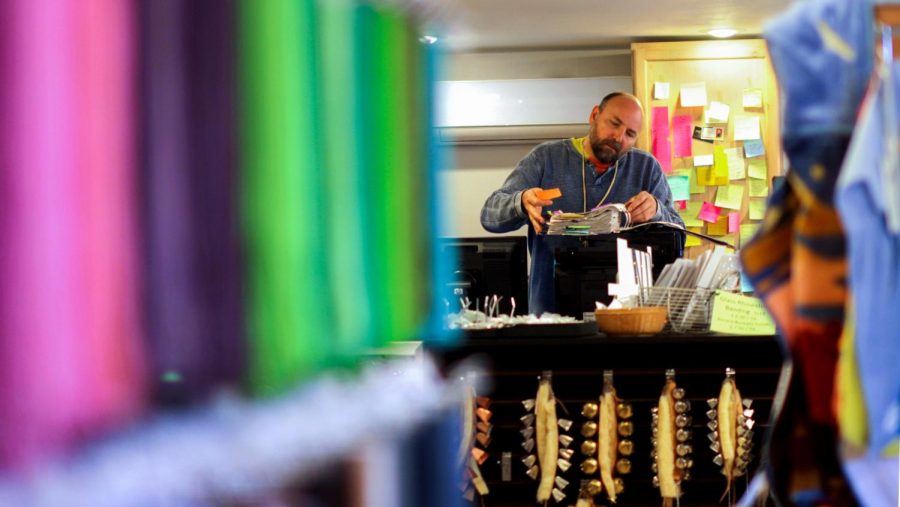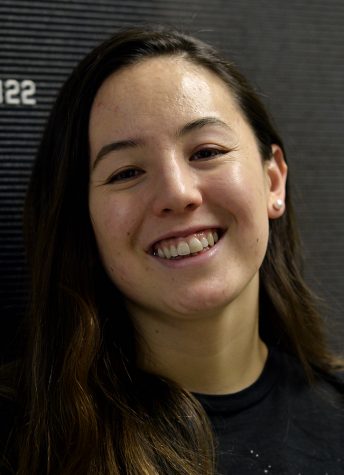Shop owner reflects on business
In the little town of Lapwai, Idaho, Jon McConville discusses how his business came to be and its place in the community
RACHEL SUN | THE DAILY EVERGREEN
Jon McConville, owner of Moccasin Flats Trading Post, sorts through paperwork at his store Friday, May 17. The shop was started as his mother’s idea, and now serves to provide beads, shells and other decorations for powwow regalia in addition to art and jewelry by local artists.
July 2, 2019
On an early Friday afternoon, Jon McConville attends to business behind the counter in his small but colorful one-room shop.
One wall is adorned with cowry shells, hairpipe made of bone and horn, brass concho and metal sequins. Opposite to that, rows of glass beads hang from hooks creating a bright rainbow of green, blue, pink, yellow, orange and red.
In the town of Lapwai, Idaho, population 1,137, Moccasin Flats Trading Post stands out almost as much as the beads on the wall. On this particular day, it was raining and gray. The cars driving down the road are few and far between. But inside, the small space is warm and bright with color.
McConville said his mother, a woman of German and Irish ancestry who married into the Nez Perce Tribe, came up with the idea for the store.
“She wanted a little shop to make dolls and shawls. This property was available, and my brother and I purchased it,” he said. “Then she wanted beads, and it became a bead store.”
The shop started with just consignment before the family business began purchasing items outright as they kept growing, McConville said. The business started small with some beads, dolls, shawls, and a little case with plastic flower garland with a few handmade items inside.
Over 15 years, Moccasin Flats changed as McConville and his mother developed relationships with local artists and brought in different items as customers asked for them, he said.
In December, McConville’s mother passed away, he said. But what she built carries on today.
“She had a big heart, and she had good ideas, and she was always willing to put forth what it would take to make those things happen,” he said. “I think she fell in love with Lapwai, and just being married into the tribe all these years, she had a vision of a way to give back.”
He still sees the children, now teenagers, who used to drop by the store for the candy bowl his mother kept.
“She insisted to do it out of her own pocket,” McConville said. “The kids would come by after school and want a piece of candy.”
She would ask the children to teach her a Nez Perce, or “Niimiipuu” word, he said, in exchange for a candy.
“There’s a big emphasis on language here,” McConville said. “The day-to-day use of it has been lost, and there’s a big effort within the tribe and the community and the education system to bring that back.”
Evidence of those efforts to bring back the language are all over town, for those who care to look.
Signs a few yards away from the shop show the English names of the streets, followed by the Niimiipuu ones. Moccasin Flats Trading Post stands at the corner of South Main, Street (lu’ q’íickin ‘ikee ‘ískit) and Locust Avenue (tin’ éhtitkin ikeey).
Just down the road, the local high school teaches the Nez Perce language, while the tribal radio station, KIYE, has storytelling and language programs aired.
Similarly to the language, many of the wares Moccasin Flats sells were also brought to the shop by a desire to reinforce cultural practices. The beads, shells, concho, horse hair and rawhide on the walls aren’t just beautiful. They are there because customers asked for them, and buy them for regalia used in events such as powwows.
“I think each day it sort of grew with what the community needed,” McConville said.
Since Moccasin Flats opened years ago, it’s carved out its own special place within the community, McConville said.
“That feels good,” he said. “It’s hard to describe. A place to go to show your things, a place to go to see pretty things, and that’s been the real payoff.”










